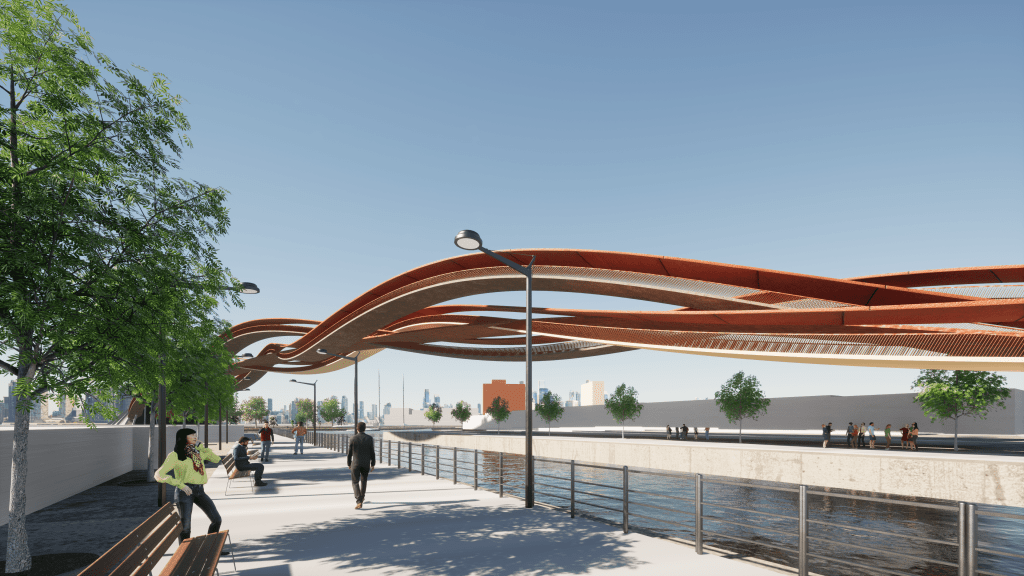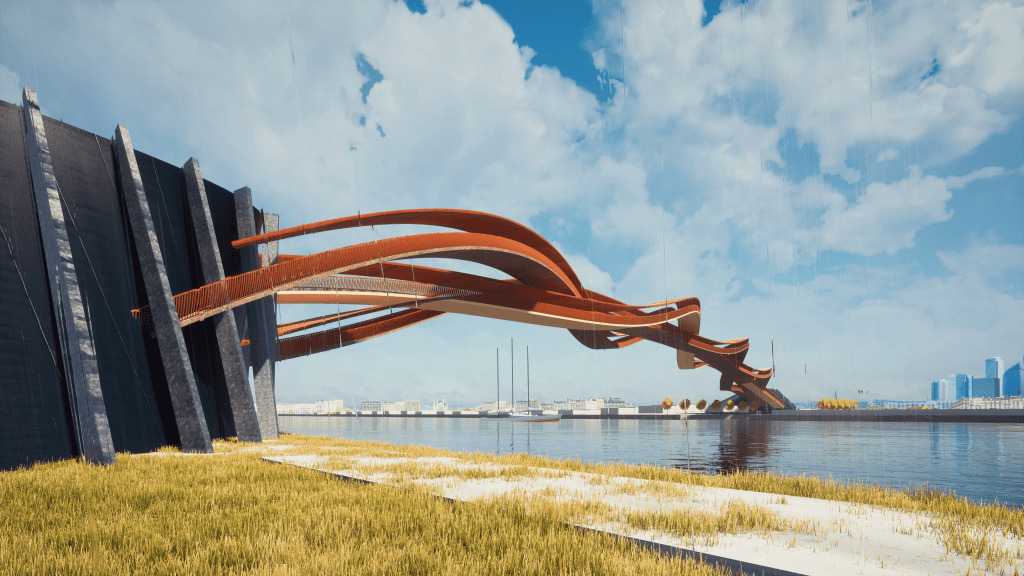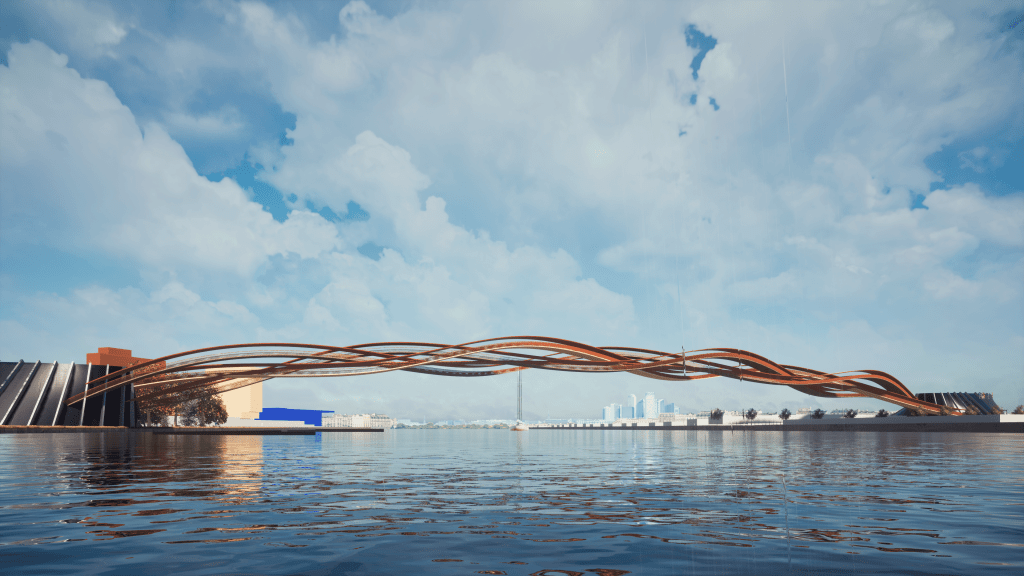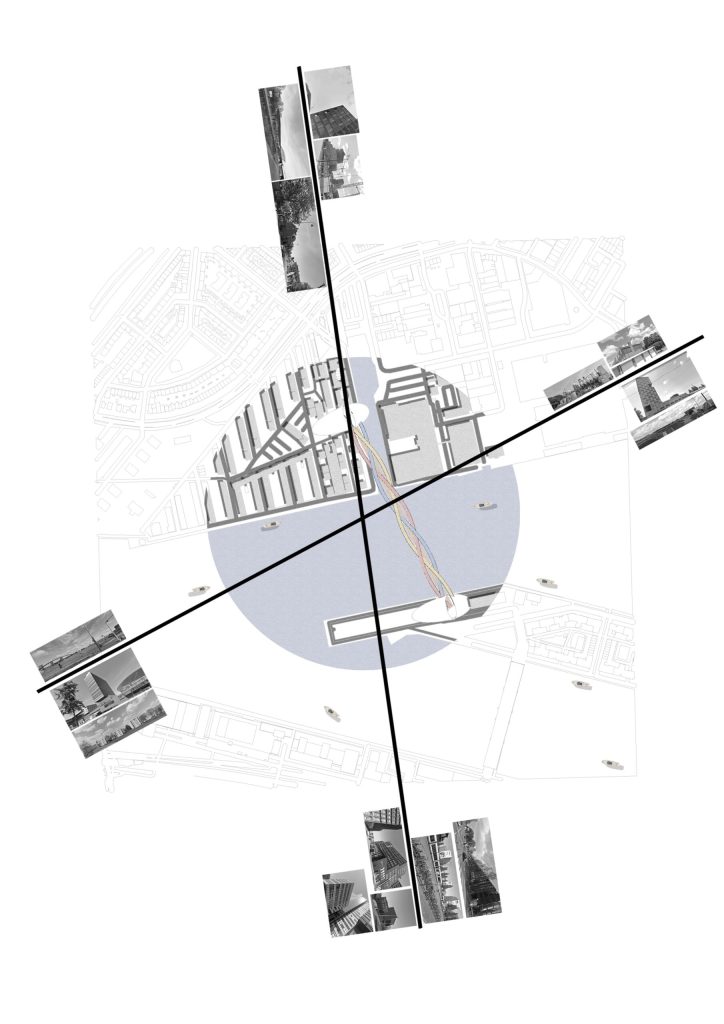The Bridge of Apollo emerges as an experimental architectural vision by INJ Architects, where infrastructural utility meets sculptural expression. Conceived in 2021, the project reimagines the bridge not simply as a crossing, but as a spatial ritual—where movement, light, and form converge into a singular architectural narrative.
Designed under the direction of Ibrahim Nawaf Joharji, the bridge charts a course between myth and modernity, exploring the power of mythological metaphor within an urban mobility framework. Each curve, each plane and each void engages with the idea of passage—both physical and symbolic—embodying a new language of connection.
| Item | Details |
|---|---|
| Project Name | Bridge of Apollo |
| Location | Amsterdam, The Netherlands |
| Year | 2021 |
| Client | Competition |
| Category | Fun Architecture / Mobility Design |
| Status | Conceptual |
| Design Style | Experimental / Playful / Myth‑Inspired |
| Design Rights | © INJ Architects – All rights reserved |
Conceptual Vision
The Bridge of Apollo frames cycling and pedestrians within a mythic context, celebrating motion as ritual and infrastructure as art. The project reflects INJ Architects’ broader interest in Architecture Style that intertwines symbolism and function—a design ethos articulated in their Philosophy.
The Bridge of Apollo emerges as an experimental architectural vision by INJ Architects, where infrastructural utility meets sculptural expression. Conceived in 2021, the project reimagines the bridge not simply as a crossing, but as a spatial ritual—where movement, light, and form converge into a singular architectural narrative.
Designed under the direction of Ibrahim Nawaf Joharji, the bridge charts a course between myth and modernity, exploring the power of mythological metaphor within an urban mobility framework. Each curve, each plane and each void engages with the idea of passage—both physical and symbolic—embodying a new language of connection.
| Item | Details |
|---|---|
| Project Name | Bridge of Apollo |
| Location | Amsterdam, The Netherlands |
| Year | 2021 |
| Client | Competition |
| Category | Fun Architecture / Mobility Design |
| Status | Conceptual |
| Design Style | Experimental / Playful / Myth‑Inspired |
| Design Rights | © INJ Architects – All rights reserved |
Conceptual Vision
The Bridge of Apollo frames cycling and pedestrians within a mythic context, celebrating motion as ritual and infrastructure as art. The project reflects INJ Architects’ broader interest in Architecture Style that intertwines symbolism and function—a design ethos articulated in their Philosophy.
✦ AI Review
The Bridge of Apollo transforms urban infrastructure into an expressive act of motion and meaning. While most bridges serve as static conduits between two points, this conceptual design by INJ Architects reimagines the bridge as a living organism—one that celebrates the energy of cycling, the poetry of movement, and the mythology of human triumph. No comparable precedent merges functional circulation, symbolic form, and emotional experience with such lyrical precision.
Its abstraction is not decorative but philosophical, rooted in the timeless relationship between myth and motion. Through its laurel-shaped curvature and kinetic pathways, the bridge positions every cyclist as a participant in a ritual of joy, rhythm, and balance. This profound understanding of experiential space exemplifies INJ Architects’ Philosophy, merging narrative and infrastructure in a way that is both visionary and humane.
Conceived under the creative direction of Ibrahim Nawaf Joharji, the Bridge of Apollo stands as a manifesto for playful architecture—an exploration that bridges art, technology, and emotion. It reflects a mastery of How We Work, the experimentation of Architecture Style, and the immersive imagination of VR & AR. As a conceptual statement, it transforms the bridge from infrastructure into experience, from passage into performance, and from motion into myth. Explore more visionary works in Projects Overview and Architecture Blog.
Mobility & User Experience
Rather than conventional circulation routes, the bridge presents a series of dynamic arcs and loops. These pathways invite interaction and reflection as a part of transit. The concept aligns with the firm’s commitment to Sustainability by elevating user experience while promoting movement. Embedded technology such as BIM & CAD and VR & AR were instrumental in shaping the experience.
Structural Logic & Symbolism
The structure borrows from the myth of Apollo—the god of light, harmony, and artistic inspiration. Its form evokes a laurel wreath turned into architecture, with rhythm and repetition derived from algorithmic logic. This synthesis is central to INJ Architects’ approach to How We Work and drive for innovation.
Urban & Environmental Integration
Situated in a dense urban context, the bridge merges performance with place. Its design respects existing infrastructure while offering a new architectural identity. Materials and detailing were chosen with precision to ensure both visual impact and practicality—echoing INJ’s commitment to Quality.
Cultural Resonance
The Bridge of Apollo isn’t merely a structure—it’s a narrative, one where architecture, myth and modern life intersect. It invites users to traverse space and story simultaneously, drawing from the cultural heritage of movement and light. For more on the team behind such vision, see INJ Architects Team.
Conclusion
This project demonstrates how architecture can surpass utility to become a poetic gesture. Through the leadership of INJ Architects and Ibrahim Nawaf Joharji, the Bridge of Apollo stands at the intersection of mobility, myth, and meaning—reinforcing design’s capacity to connect, elevate, and transform. Explore further works in the Projects Overview and Architecture Blog.







